LaCosta Lounge's old liquor store is becoming the Shorebreak Cafe,
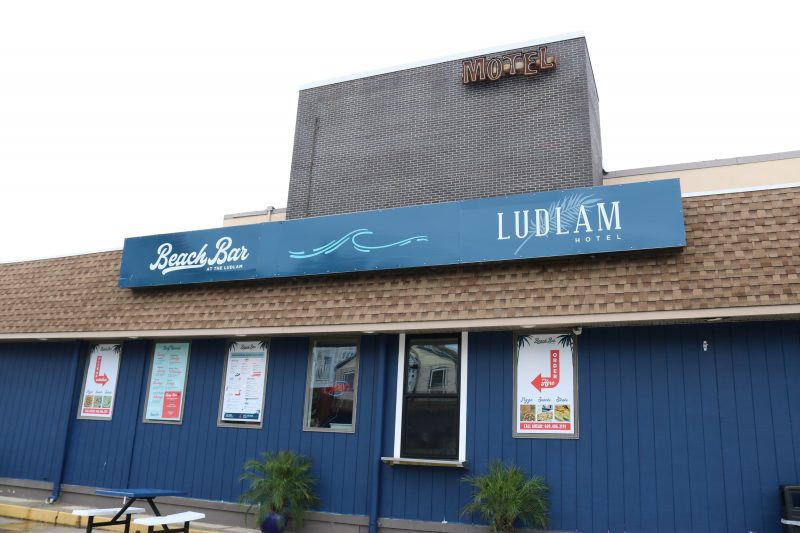 By DONALD WITTKOWSKI
By DONALD WITTKOWSKI
After a contentious public hearing, City Council on Tuesday approved a zoning change for liquor license transfers – a crucial step for the rebranding of the iconic LaCosta Lounge nightclub in Sea Isle City into a new bar.
The ordinance includes new language that defines when a liquor license can be “grandfathered” in at a bar.
Previously, a 2003 zoning law had blocked the former liquor license of the landmark LaCosta Lounge from being grandfathered in at the newly opened Beach Bar, even though it is the same location.
The owners of the Beach Bar are redeveloping the old LaCosta Lounge site, but have not yet been able to secure city approval for a “place to place” liquor license transfer that would allow them to begin selling alcoholic beverages.
However, Council concluded that the 2003 zoning law needed to be revised to protect all of the bars, nightclubs and liquor stores in Sea Isle that might potentially end up in the same predicament as the Beach Bar.
“There’s a flaw in our ordinance and we don’t want other licensed establishments to run into the same position,” Councilwoman Mary Tighe said.
Tighe and fellow Council members Frank Edwardi, Jack Gibson and J.B. Feeley voted for the change. Council President William Kehner recused himself from voting to avoid any potential conflict of interest stemming from his old job as manager of the LaCosta’s former liquor store.
Edwardi told the packed audience inside the Council chambers that there was “a lot of hate in the room” between opponents and supporters of the liquor license transfer.
“Let’s not have that hatred. Let’s do the right thing,” Edwardi said.
In an interview after the Council meeting, Edwardi said it was time for the 2003 zoning law to be updated.
“It’s about doing the right thing for the city,” he said of Council’s vote.
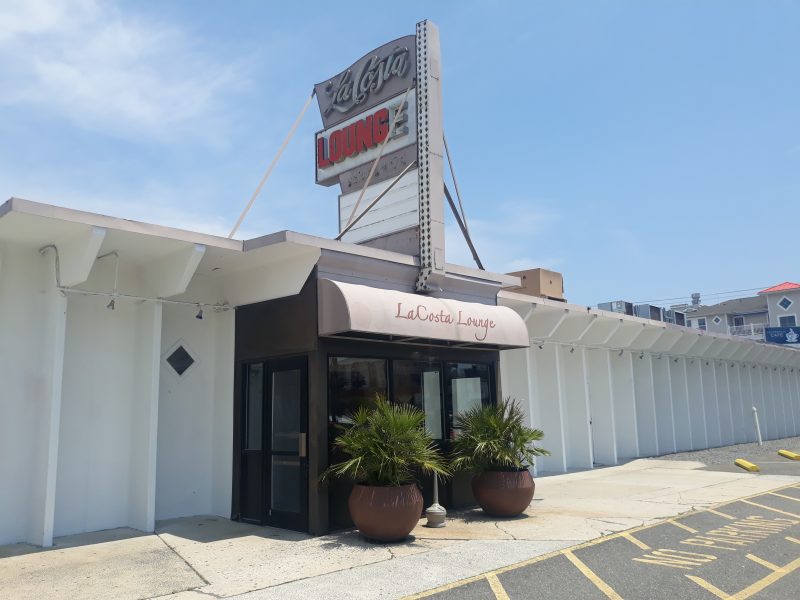
The LaCosta Lounge sign is one of the last remnants of the old bar and nightclub.
The new ordinance includes language that would allow the liquor license to remain at the same location following a change in ownership at the former LaCosta site at the corner of John F. Kennedy Boulevard and Landis Avenue.
“Today was a big step in the right direction at the Beach Bar,” the bar said in a Facebook statement following Council’s vote. “We are thankful to the City Council for making this happen. We received the 4 votes needed today to make the revised ordinance a law.”
The ordinance was the first of two approvals the Beach Bar needs from City Council before it can begin serving alcohol. Next, Council will hold a special meeting on July 16 to consider formally approving the liquor license transfer to the Beach Bar.
Assuming Council grants its approval for the transfer, the Beach Bar will begin selling alcohol on July 17, the bar’s owner, Christopher Glancey, said in an interview.
For now, the Beach Bar is operating with BYOB dining service.
Glancey and his business partner Bob Morris bought LaCosta Lounge in 2018 for $7.3 million and are renovating the property as part of its rebranding. They once planned on calling it the LaCosta Beach Bar, but changed the name again to the Beach Bar at the Ludlam.
During its nearly 50 years in business, LaCosta Lounge became one of the Jersey Shore’s best-known bars and nightclubs for multiple generations of customers.
LaCosta’s former liquor license became a “pocket” license after the lease for the nightclub’s former owner, James Bennett, expired in September 2020. That meant the license was no longer affiliated with any specific bar and did not meet the grandfather clause requirements of the 2003 zoning law.
Glancey and Morris battled with Bennett over possession of the liquor license. After a court ruling in their favor, Glancey and Morris bought the license from Bennett for $825,000.
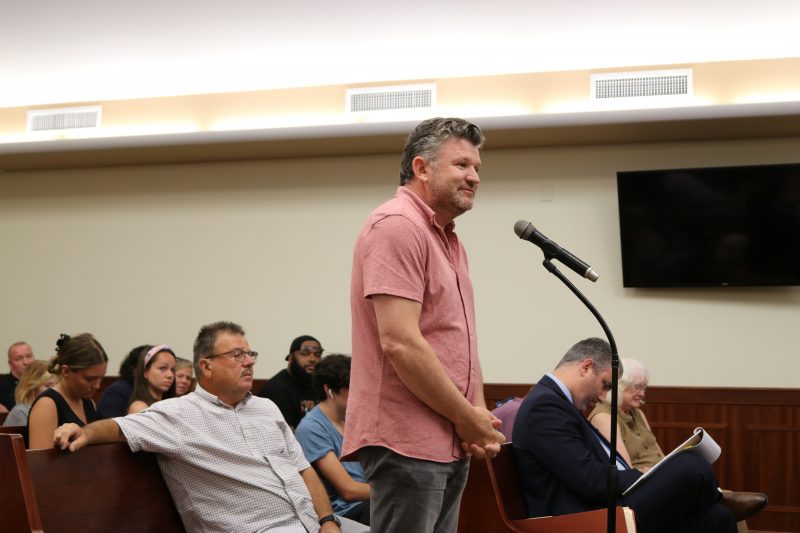
Beach Bar owner Christopher Glancey addresses Council during the meeting.
Following a lengthy discussion at the June 8 Council meeting, the governing body introduced an ordinance to revise the 2003 zoning law to allow the LaCosta’s former liquor license to be grandfathered in at the Beach Bar. Tuesday’s vote and public hearing represented the final approval for the ordinance.
The public hearing dragged on for about 90 minutes and produced heated remarks both favoring and opposing the liquor license transfer. Some of the comments focused on the legal and personal battles between Glancey and Bennett over the liquor license.
In remarks to Council, Glancey said he was sorry that the governing body was pulled into the middle of the fray. He called the opposition “a sham.”
“It’s not about me. Everybody wants to make it about me. I’m sorry,” Glancey told Council.
Glancey went on to say that the zoning change would protect all of the bars and liquor stores in town in the event they needed their liquor licenses to be grandfathered in at their same location. He noted that could happen if, for instance, the bars or liquor stores had to rebuild following a fire or another disaster.
In its Facebook statement, the Beach Bar denied that the new ordinance was designed to help out only Glancey and the Beach Bar.
“So everyone is clear, the city had to tweak the language in one section so that the ordinance wasn’t misinterpreted for any liquor license owner. Our location, not just the license, is now grandfathered in,” the Beach Bar said.
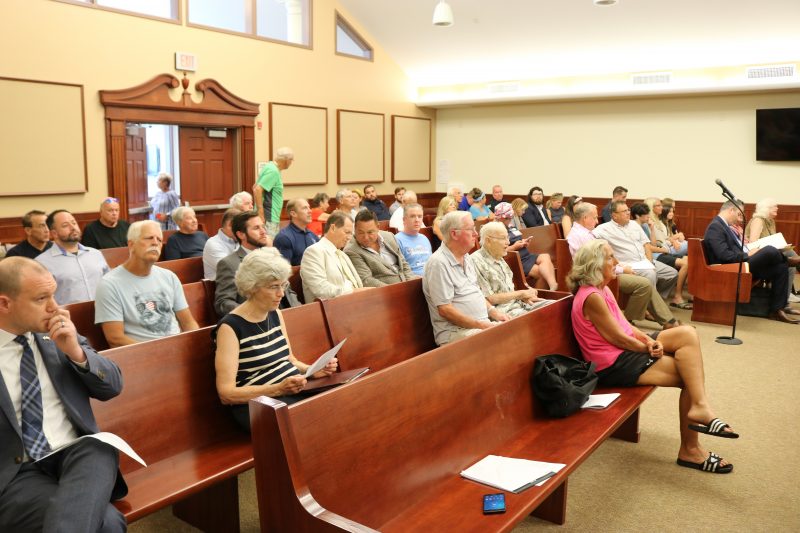
Audience members nearly pack the Council chambers for the heated public hearing.
However, a few of the opponents of the liquor license transfer asserted that Council was favoring Glancey by even considering a change in the 2003 law.
Colin Bell, an attorney representing some of the opponents, called it “special legislation to help one business.”
Suggesting that there may be legal challenges ahead, Bell told Council that he believes the ordinance is unconstitutional.
Marcus Karavan, an attorney representing Bennett, also urged Council to reject the zoning change.
Opponents also alleged that Glancey waited too long to apply for the liquor license transfer, forcing Council to scramble at the last minute to revise the zoning law.
“The license wasn’t transferred because he didn’t do what he was supposed to do,” said Angel Dalrymple, a Sea Isle resident whose family owns Dalrymple’s Card & Gift Shoppe.
Glancey’s attorney, Michael Malinsky, denied those claims, saying that the application was filed “as expeditiously as possible.”
Sea Isle resident Bob Bakley, an opponent, called the license transfer “a big sham.” Bakley argued that it was “a waste of time” for Council to even consider it.
Supporters told Council that the Beach Bar would be crucial for creating new jobs and giving Sea Isle a new attraction to replace the aging LaCosta Lounge.
“Listen to the people who need the jobs and the work and are depending on the bar to make money,” Sea Isle resident Anne Organ said.
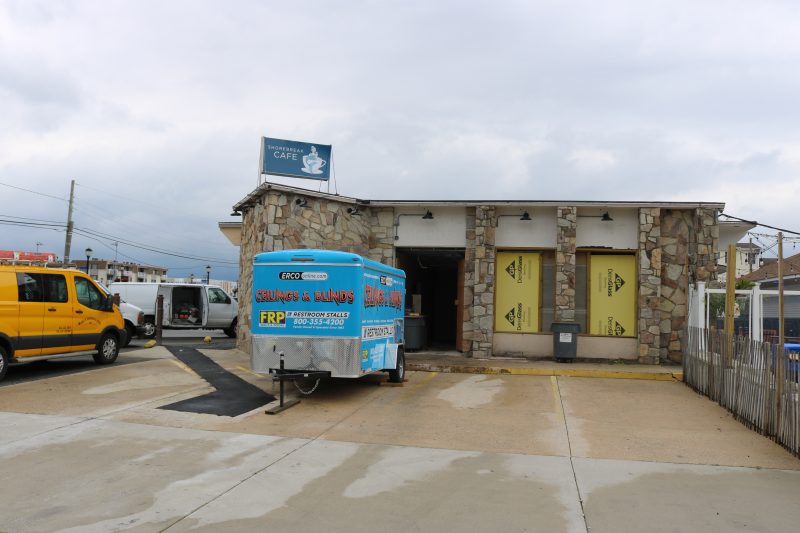
Renovations continue on the former LaCosta Lounge to transform it into the Beach Bar.
A few members of the public who spoke in support of the license transfer are Beach Bar employees. They urged Council to approve the transfer so that the Beach Bar could begin selling alcohol and they could have their jobs over the lucrative summer tourism season.
“Just give us a chance to work. That’s all I’m asking all of you,” bartender Chance Hayes said to the Council members.
Gregory Rivera, executive chef at the Beach Bar, said the liquor license is critical for helping the new business grow.
“We’re not the old LaCosta. We’re better,” Rivera said.
 By DONALD WITTKOWSKI
After a contentious public hearing, City Council on Tuesday approved a zoning change for liquor license transfers – a crucial step for the rebranding of the iconic LaCosta Lounge nightclub in Sea Isle City into a new bar.
The ordinance includes new language that defines when a liquor license can be “grandfathered” in at a bar.
Previously, a 2003 zoning law had blocked the former liquor license of the landmark LaCosta Lounge from being grandfathered in at the newly opened Beach Bar, even though it is the same location.
The owners of the Beach Bar are redeveloping the old LaCosta Lounge site, but have not yet been able to secure city approval for a “place to place” liquor license transfer that would allow them to begin selling alcoholic beverages.
However, Council concluded that the 2003 zoning law needed to be revised to protect all of the bars, nightclubs and liquor stores in Sea Isle that might potentially end up in the same predicament as the Beach Bar.
“There’s a flaw in our ordinance and we don’t want other licensed establishments to run into the same position,” Councilwoman Mary Tighe said.
Tighe and fellow Council members Frank Edwardi, Jack Gibson and J.B. Feeley voted for the change. Council President William Kehner recused himself from voting to avoid any potential conflict of interest stemming from his old job as manager of the LaCosta’s former liquor store.
Edwardi told the packed audience inside the Council chambers that there was “a lot of hate in the room” between opponents and supporters of the liquor license transfer.
“Let’s not have that hatred. Let’s do the right thing,” Edwardi said.
In an interview after the Council meeting, Edwardi said it was time for the 2003 zoning law to be updated.
“It’s about doing the right thing for the city,” he said of Council’s vote.
By DONALD WITTKOWSKI
After a contentious public hearing, City Council on Tuesday approved a zoning change for liquor license transfers – a crucial step for the rebranding of the iconic LaCosta Lounge nightclub in Sea Isle City into a new bar.
The ordinance includes new language that defines when a liquor license can be “grandfathered” in at a bar.
Previously, a 2003 zoning law had blocked the former liquor license of the landmark LaCosta Lounge from being grandfathered in at the newly opened Beach Bar, even though it is the same location.
The owners of the Beach Bar are redeveloping the old LaCosta Lounge site, but have not yet been able to secure city approval for a “place to place” liquor license transfer that would allow them to begin selling alcoholic beverages.
However, Council concluded that the 2003 zoning law needed to be revised to protect all of the bars, nightclubs and liquor stores in Sea Isle that might potentially end up in the same predicament as the Beach Bar.
“There’s a flaw in our ordinance and we don’t want other licensed establishments to run into the same position,” Councilwoman Mary Tighe said.
Tighe and fellow Council members Frank Edwardi, Jack Gibson and J.B. Feeley voted for the change. Council President William Kehner recused himself from voting to avoid any potential conflict of interest stemming from his old job as manager of the LaCosta’s former liquor store.
Edwardi told the packed audience inside the Council chambers that there was “a lot of hate in the room” between opponents and supporters of the liquor license transfer.
“Let’s not have that hatred. Let’s do the right thing,” Edwardi said.
In an interview after the Council meeting, Edwardi said it was time for the 2003 zoning law to be updated.
“It’s about doing the right thing for the city,” he said of Council’s vote.
 The LaCosta Lounge sign is one of the last remnants of the old bar and nightclub.
The new ordinance includes language that would allow the liquor license to remain at the same location following a change in ownership at the former LaCosta site at the corner of John F. Kennedy Boulevard and Landis Avenue.
“Today was a big step in the right direction at the Beach Bar,” the bar said in a Facebook statement following Council’s vote. “We are thankful to the City Council for making this happen. We received the 4 votes needed today to make the revised ordinance a law.”
The ordinance was the first of two approvals the Beach Bar needs from City Council before it can begin serving alcohol. Next, Council will hold a special meeting on July 16 to consider formally approving the liquor license transfer to the Beach Bar.
Assuming Council grants its approval for the transfer, the Beach Bar will begin selling alcohol on July 17, the bar’s owner, Christopher Glancey, said in an interview.
For now, the Beach Bar is operating with BYOB dining service.
Glancey and his business partner Bob Morris bought LaCosta Lounge in 2018 for $7.3 million and are renovating the property as part of its rebranding. They once planned on calling it the LaCosta Beach Bar, but changed the name again to the Beach Bar at the Ludlam.
During its nearly 50 years in business, LaCosta Lounge became one of the Jersey Shore’s best-known bars and nightclubs for multiple generations of customers.
LaCosta’s former liquor license became a “pocket” license after the lease for the nightclub’s former owner, James Bennett, expired in September 2020. That meant the license was no longer affiliated with any specific bar and did not meet the grandfather clause requirements of the 2003 zoning law.
Glancey and Morris battled with Bennett over possession of the liquor license. After a court ruling in their favor, Glancey and Morris bought the license from Bennett for $825,000.
The LaCosta Lounge sign is one of the last remnants of the old bar and nightclub.
The new ordinance includes language that would allow the liquor license to remain at the same location following a change in ownership at the former LaCosta site at the corner of John F. Kennedy Boulevard and Landis Avenue.
“Today was a big step in the right direction at the Beach Bar,” the bar said in a Facebook statement following Council’s vote. “We are thankful to the City Council for making this happen. We received the 4 votes needed today to make the revised ordinance a law.”
The ordinance was the first of two approvals the Beach Bar needs from City Council before it can begin serving alcohol. Next, Council will hold a special meeting on July 16 to consider formally approving the liquor license transfer to the Beach Bar.
Assuming Council grants its approval for the transfer, the Beach Bar will begin selling alcohol on July 17, the bar’s owner, Christopher Glancey, said in an interview.
For now, the Beach Bar is operating with BYOB dining service.
Glancey and his business partner Bob Morris bought LaCosta Lounge in 2018 for $7.3 million and are renovating the property as part of its rebranding. They once planned on calling it the LaCosta Beach Bar, but changed the name again to the Beach Bar at the Ludlam.
During its nearly 50 years in business, LaCosta Lounge became one of the Jersey Shore’s best-known bars and nightclubs for multiple generations of customers.
LaCosta’s former liquor license became a “pocket” license after the lease for the nightclub’s former owner, James Bennett, expired in September 2020. That meant the license was no longer affiliated with any specific bar and did not meet the grandfather clause requirements of the 2003 zoning law.
Glancey and Morris battled with Bennett over possession of the liquor license. After a court ruling in their favor, Glancey and Morris bought the license from Bennett for $825,000.
 Beach Bar owner Christopher Glancey addresses Council during the meeting.
Following a lengthy discussion at the June 8 Council meeting, the governing body introduced an ordinance to revise the 2003 zoning law to allow the LaCosta’s former liquor license to be grandfathered in at the Beach Bar. Tuesday’s vote and public hearing represented the final approval for the ordinance.
The public hearing dragged on for about 90 minutes and produced heated remarks both favoring and opposing the liquor license transfer. Some of the comments focused on the legal and personal battles between Glancey and Bennett over the liquor license.
In remarks to Council, Glancey said he was sorry that the governing body was pulled into the middle of the fray. He called the opposition “a sham.”
“It’s not about me. Everybody wants to make it about me. I’m sorry,” Glancey told Council.
Glancey went on to say that the zoning change would protect all of the bars and liquor stores in town in the event they needed their liquor licenses to be grandfathered in at their same location. He noted that could happen if, for instance, the bars or liquor stores had to rebuild following a fire or another disaster.
In its Facebook statement, the Beach Bar denied that the new ordinance was designed to help out only Glancey and the Beach Bar.
“So everyone is clear, the city had to tweak the language in one section so that the ordinance wasn’t misinterpreted for any liquor license owner. Our location, not just the license, is now grandfathered in,” the Beach Bar said.
Beach Bar owner Christopher Glancey addresses Council during the meeting.
Following a lengthy discussion at the June 8 Council meeting, the governing body introduced an ordinance to revise the 2003 zoning law to allow the LaCosta’s former liquor license to be grandfathered in at the Beach Bar. Tuesday’s vote and public hearing represented the final approval for the ordinance.
The public hearing dragged on for about 90 minutes and produced heated remarks both favoring and opposing the liquor license transfer. Some of the comments focused on the legal and personal battles between Glancey and Bennett over the liquor license.
In remarks to Council, Glancey said he was sorry that the governing body was pulled into the middle of the fray. He called the opposition “a sham.”
“It’s not about me. Everybody wants to make it about me. I’m sorry,” Glancey told Council.
Glancey went on to say that the zoning change would protect all of the bars and liquor stores in town in the event they needed their liquor licenses to be grandfathered in at their same location. He noted that could happen if, for instance, the bars or liquor stores had to rebuild following a fire or another disaster.
In its Facebook statement, the Beach Bar denied that the new ordinance was designed to help out only Glancey and the Beach Bar.
“So everyone is clear, the city had to tweak the language in one section so that the ordinance wasn’t misinterpreted for any liquor license owner. Our location, not just the license, is now grandfathered in,” the Beach Bar said.
 Audience members nearly pack the Council chambers for the heated public hearing.
However, a few of the opponents of the liquor license transfer asserted that Council was favoring Glancey by even considering a change in the 2003 law.
Colin Bell, an attorney representing some of the opponents, called it “special legislation to help one business.”
Suggesting that there may be legal challenges ahead, Bell told Council that he believes the ordinance is unconstitutional.
Marcus Karavan, an attorney representing Bennett, also urged Council to reject the zoning change.
Opponents also alleged that Glancey waited too long to apply for the liquor license transfer, forcing Council to scramble at the last minute to revise the zoning law.
“The license wasn’t transferred because he didn’t do what he was supposed to do,” said Angel Dalrymple, a Sea Isle resident whose family owns Dalrymple’s Card & Gift Shoppe.
Glancey’s attorney, Michael Malinsky, denied those claims, saying that the application was filed “as expeditiously as possible.”
Sea Isle resident Bob Bakley, an opponent, called the license transfer “a big sham.” Bakley argued that it was “a waste of time” for Council to even consider it.
Supporters told Council that the Beach Bar would be crucial for creating new jobs and giving Sea Isle a new attraction to replace the aging LaCosta Lounge.
“Listen to the people who need the jobs and the work and are depending on the bar to make money,” Sea Isle resident Anne Organ said.
Audience members nearly pack the Council chambers for the heated public hearing.
However, a few of the opponents of the liquor license transfer asserted that Council was favoring Glancey by even considering a change in the 2003 law.
Colin Bell, an attorney representing some of the opponents, called it “special legislation to help one business.”
Suggesting that there may be legal challenges ahead, Bell told Council that he believes the ordinance is unconstitutional.
Marcus Karavan, an attorney representing Bennett, also urged Council to reject the zoning change.
Opponents also alleged that Glancey waited too long to apply for the liquor license transfer, forcing Council to scramble at the last minute to revise the zoning law.
“The license wasn’t transferred because he didn’t do what he was supposed to do,” said Angel Dalrymple, a Sea Isle resident whose family owns Dalrymple’s Card & Gift Shoppe.
Glancey’s attorney, Michael Malinsky, denied those claims, saying that the application was filed “as expeditiously as possible.”
Sea Isle resident Bob Bakley, an opponent, called the license transfer “a big sham.” Bakley argued that it was “a waste of time” for Council to even consider it.
Supporters told Council that the Beach Bar would be crucial for creating new jobs and giving Sea Isle a new attraction to replace the aging LaCosta Lounge.
“Listen to the people who need the jobs and the work and are depending on the bar to make money,” Sea Isle resident Anne Organ said.
 Renovations continue on the former LaCosta Lounge to transform it into the Beach Bar.
A few members of the public who spoke in support of the license transfer are Beach Bar employees. They urged Council to approve the transfer so that the Beach Bar could begin selling alcohol and they could have their jobs over the lucrative summer tourism season.
“Just give us a chance to work. That’s all I’m asking all of you,” bartender Chance Hayes said to the Council members.
Gregory Rivera, executive chef at the Beach Bar, said the liquor license is critical for helping the new business grow.
“We’re not the old LaCosta. We’re better,” Rivera said.
Renovations continue on the former LaCosta Lounge to transform it into the Beach Bar.
A few members of the public who spoke in support of the license transfer are Beach Bar employees. They urged Council to approve the transfer so that the Beach Bar could begin selling alcohol and they could have their jobs over the lucrative summer tourism season.
“Just give us a chance to work. That’s all I’m asking all of you,” bartender Chance Hayes said to the Council members.
Gregory Rivera, executive chef at the Beach Bar, said the liquor license is critical for helping the new business grow.
“We’re not the old LaCosta. We’re better,” Rivera said.